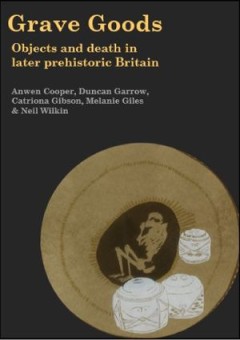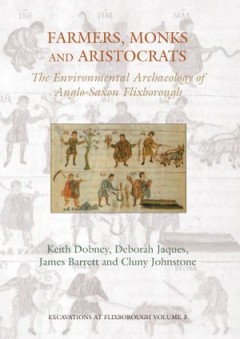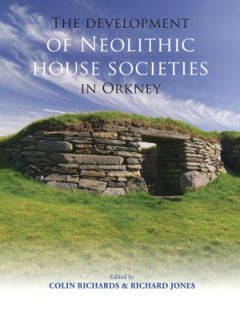Filter by

Grave Goods Objects and Death in Later Prehistoric Britain
Britain is internationally renowned for the high quality and exquisite crafting of its later prehistoric grave goods (c. 4000 BC to AD 43). Many of prehistoric Britain's most impressive artefacts have come from graves. Interred with both inhumations and cremations, they provide some of the most durable and well-preserved insights into personal identity and the prehistoric life-course, yet they …
- Edition
- -
- ISBN/ISSN
- 9781789257489
- Collation
- -
- Series Title
- -
- Call Number
- -

Fiskerton Iron Age Timber Causeway with Iron Age and Roman Votive Offerings
Fiskerton, located in the Witham valley of Lincoln, is one of only a handful of excavated sites in Europe to reveal the Iron Age practice of ritually destroying special and elite objects by placing them in a body of water. This volume reports on the 1981 excavations on the bank of the River Witham and provides fascinating insights into this important aspect of Iron Age religion and culture. A r…
- Edition
- -
- ISBN/ISSN
- 9781789256499
- Collation
- -
- Series Title
- -
- Call Number
- -

Farmers, Monks and Aristocrats The environmental archaeology of Anglo-Saxon …
The environmental archaeological evidence from the site of Flixborough (in particular the animal bone assemblage) provides a series of unique insights into Anglo-Saxon life in England during the 8th to 10th centuries. The research reveals detailed evidence for the local and regional environment, many aspects of the local and regional agricultural economy, changing resource exploitation strategi…
- Edition
- -
- ISBN/ISSN
- 9781782974864
- Collation
- -
- Series Title
- -
- Call Number
- -

Excavations at St James's Priory, Bristol
The Benedictine Priory of St James was established just outside the medieval city of Bristol in 1129AD. Two areas were excavated: Site 1 to the east of the Priory church, and Site 2 to the west. The Priory was largely destroyed during the Dissolution of 1540, but the area around Site 1 remained in use during the 17th and 18th centuries as housing was built there. Site 2 was in use from the late…
- Edition
- -
- ISBN/ISSN
- 9781789254419
- Collation
- -
- Series Title
- -
- Call Number
- -

The Early Medieval Settlement Remains from Flixborough, Lincolnshire The Occ…
Volume 1 focuses on the occupation sequence, looking at the structural and stratigraphical evidence from the site, and interpreting the changing use of the site during its lengthy occupation. This interpretation of the occupation sequence forms the basis for all thematic discussions in Volumes 3 and 4. It also examines the evidence for burials at the site, and places this into the wider context…
- Edition
- -
- ISBN/ISSN
- 9781782975632
- Collation
- -
- Series Title
- -
- Call Number
- -

The Development of Neolithic House Societies in Orkney
Considering that Orkney is a group of relatively small islands lying off the northeast coast of the Scottish mainland, its wealth of Neolithic archaeology is truly extraordinary. An assortment of houses, chambered cairns, stone circles, standing stones and passage graves provides an unusually comprehensive range of archaeological and architectural contexts. Yet, in the early 1990s, there was a …
- Edition
- -
- ISBN/ISSN
- 9781914427091
- Collation
- -
- Series Title
- -
- Call Number
- -

Colchester, Fortress of the War God An Archaeological Assessment
This volume is a critical assessment of the current state of archaeological knowledge of the settlement originally called Camulodunon and now known as Colchester. The town has been the subject of antiquarian interest since the late 16th century and the first modern archaeological excavations occurred in 1845 close to Colchester Castle, the towns most prominent historic site.The earliest signifi…
- Edition
- -
- ISBN/ISSN
- 9781789258929
- Collation
- -
- Series Title
- -
- Call Number
- -

The City by the Pool Assessing the Archaeology of the City of Lincoln
This volume offers a new and up-to-date synthesis of Lincoln's long history as a major city and regional capital, from prehistory to 1945. The 'City by the Pool' was a major religious centre long before the Roman invasion and from bronze-age shamans to early Baptists people have always been attracted here for spiritual as well as mundane purposes. The authors argue for the presence of a major r…
- Edition
- -
- ISBN/ISSN
- 9781789254389
- Collation
- -
- Series Title
- -
- Call Number
- -

Cities as Palimpsests? Responses to Antiquity in Eastern Mediterranean Urbanism
The metaphor of the palimpsest has been increasingly invoked to conceptualize cities with deep, living pasts. This volume seeks to think through, and beyond, the logic of the palimpsest, asking whether this fashionable trope slyly forces us to see contradiction where local inhabitants saw (and see) none, to impose distinctions that satisfy our own assumptions about historical periodization and …
- Edition
- -
- ISBN/ISSN
- 9781789257700
- Collation
- -
- Series Title
- -
- Call Number
- -

Building Memories The Neolithic Cotswold Long Barrow at Ascott-under-Wychwoo…
It is just over forty years since the start of the excavations of the Ascott-under-Wychwood long barrow (1965-69) under the direction of Don Benson. The excavations belonged to the latter part of a great period of barrow digging in southern Britain, which was ending just as, by striking contrast, intensified investigation and fieldwork at causewayed enclosures were beginning. Although a long ga…
- Edition
- -
- ISBN/ISSN
- -
- Collation
- -
- Series Title
- -
- Call Number
- -
 Computer Science, Information & General Works
Computer Science, Information & General Works  Philosophy & Psychology
Philosophy & Psychology  Religion
Religion  Social Sciences
Social Sciences  Language
Language  Pure Science
Pure Science  Applied Sciences
Applied Sciences  Art & Recreation
Art & Recreation  Literature
Literature  History & Geography
History & Geography